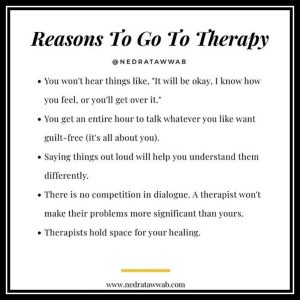Let’s Talk About Therapy (And How You Can Help Break the Stigma)
A talk was given in the October 2019 General Conference that I cannot seem to stop thinking about. It was shared by Sister Reyna Aburto during the Women’s Session. She talked about the struggles of depression and the stigma surrounding therapy and mental health.
This talk spoke to me more than others because of my personal experiences. I have attended therapy sessions and dealt with my own mental battles. Being able to relate allowed her words to really touch my heart.
I continued to reflect on her words long after the conference was over. I feel strongly that the stigmas regarding therapy and mental health need to be broken. However, in order for that to happen, I need your help.
What’s so scary about therapy?
Why is there a stigma in the first place? I’m not quite sure. Sister Aburto said that people are trying to “fit some imaginary mold.” I know that I occasionally set very unrealistic expectations for myself. I believed that my peers and fellow church members would judge me if I spoke up about my problems. This is not the truth.
“Together, we can break through the clouds of isolation and stigma so the burden of shame is lifted and miracles of healing can occur.” ~ Sister Reyna Aburto
Sister Aburto’s talk addressed this issue by reminding us that we do not need to be perfect right now. These ideas of perfectionism are “unnecessary burdens,” she said.
Elder Jeffrey Holland gave a similar talk in October of 2013 where he stated:
There should be no more shame in acknowledging [mental illness] than in acknowledging a battle with high blood pressure or the sudden appearance of a malignant tumor.
Your mental health is just as important and valid as your physical health. Because of this, I’m not quite sure why the stigma exists in the first place. However, I do know why it needs to go away.
What’s my experience?

I have struggled with anxiety for as long as I can remember. When I was young, I could hardly leave the house because of its severity. Though it may have been obvious to some, I had no idea what was going on. I thought my feelings were normal. It wasn’t until my mission that I realized I needed help. I began therapy just a week or two after getting home.
My therapist was incredible. I was dealing with multiple problems, including some family troubles. My thoughts were like a tangled ball of yarn and he sat there patiently untangling it. I felt like I was able to breathe again. I could finally think clearly.
“Like any part of the body, the brain is subject to illnesses, trauma, and chemical imbalances. When our minds are suffering, it is appropriate to seek help from God, from those around us, and from medical and mental health professionals.” ~ Sister Reyna Aburto
My favorite thing about having a therapist was his point of view. I have an extremely supportive husband, but when it came to my family issues, he was very biased. My therapist didn’t know my family. He didn’t even really know me. He was just a great listener with an outside point of view. With his unbiased opinion, he could see things I couldn’t. He could think more logically when my emotions were high.
Therapy did incredible things for me. I went out of my comfort zone, worked things out, and felt an immense weight lifted off of my shoulders. Honestly, I could not understand why other people weren’t talking about their experiences. I wish I had started sooner!
Related: 5 Truths Therapy Has Taught Me about the Atonement
Why talk about therapy?

I recently went to lunch with a friend and told her about my experience in therapy. After I shared my story, she felt comfortable confiding in me that she believes she might have seasonal depression.
My friend had always felt silly about it and that her problems weren’t big enough to need a therapist. However, after talking with me, she realized that therapy would be a good fit for her. Since then, she has found so much relief in seeking help.
If I hadn’t been open about my trial, who knows what might have happened. Sister Aburto said,
When we open up about our emotional challenges, admitting we are not perfect, we give others permission to share their struggles. Together we realize there is hope and we do not have to suffer alone.
A Hope Works speech was posted a few months ago by the Church about this exact thing. Being vulnerable with others leads to connection. If so many of us are suffering, why do it alone? There are people around you that care. If you need help, reach out. If you’ve gotten help, tell others. Someone needs to hear your story.
Breaking the stigma.
This is how we break the stigma. Speak up. Do not be afraid. Therapy is a positive experience! It’s not only for those suffering with severe, diagnosed mental health problems or addictions. Therapy is for anyone and everyone who just needs someone to listen to them.
“Your struggles do not define you, but they can refine you. Because of a ‘thorn in the flesh,’ you may have the ability to feel more compassion toward others. As guided by the Holy Ghost, share your story in order to ‘succor the weak, lift up the hands which hang down, and strengthen the feeble knees.'” ~ Sister Reyna Aburto
It is important to realize that not every therapist will be a good fit for you. If things aren’t clicking at first, don’t give up. Talk with a few until you find the right one!
Meeting with a therapist has blessed my life immensely. When I prayed for relief, I found it in therapy. You can too.
God cares about you.
Heavenly Father knows that life is hard. We knew before coming to Earth that we would face trials. Emotions can be tricky to navigate, but God has not left us without help. Elder Holland said,
If things continue to be debilitating, seek the advice of reputable people with certified training, professional skills, and good values. Be honest with them about your history and your struggles. Prayerfully and responsibly consider the counsel they give and the solutions they prescribe. If you had appendicitis, God would expect you to seek a priesthood blessing and get the best medical care available. So too with emotional disorders. Our Father in Heaven expects us to use all of the marvelous gifts He has provided in this glorious dispensation.
What about ministering?
Ministering to those dealing with mental health struggles is an important topic as well. Sister Aburto said, “Even if we do not know how to relate to what others are going through, validating that their pain is real can be an important first step in finding understanding and healing.”
Please be kind and nonjudgmental when ministering to our brothers and sisters who are struggling. There are many articles written that dive deeper into this subject. However, the best piece of advice would simply be to follow the Savior. Serve as He would serve. Love as He would love.
Related: Ministering to Latter-day Saints with Mental Disorders
What resources are available to me?

The Church offers many resources. There is a section on their website titled, “Life Help.” There you can find scriptures, talks by general authorities, videos, and other content related to whatever you might be dealing with. Another area is specifically about mental health. There is a list of free helplines, frequently asked questions, and details about helping others.
The Church also offers its own counseling. There are so many categories available. If you feel like you might need help, please look into these options and find a good fit for you.
Dozens of apps exist for those dealing with mental health issues. Some apps can even connect you with a therapist so you can text back and forth with them!
If you’re a student, check with your school. Almost every institution offers counseling for a very low price (sometimes free of charge!) They are aware that this stage of life is stressful and want to help.
So many possibilities are out there. However, if you are still struggling to find a way to talk to someone, speak with your bishop. He has access to other resources and knows your area.
Related: Let’s Talk About Mental Illness
If you benefited from this article, or know someone who could, please share it with them. Together we can break the stigma about therapy!


